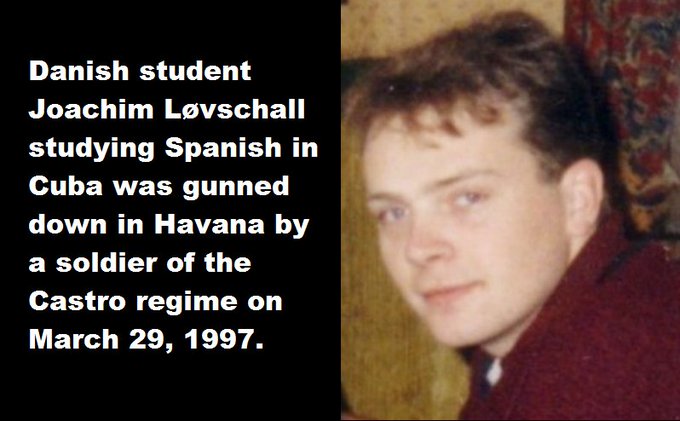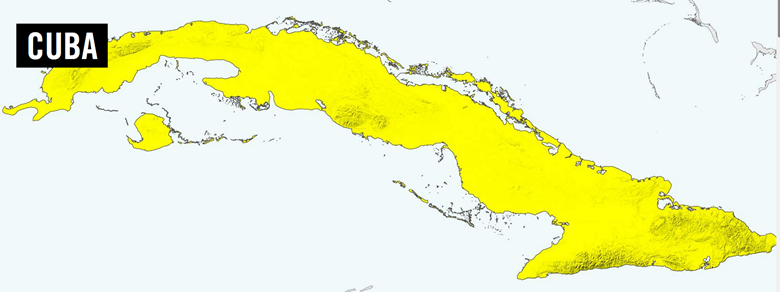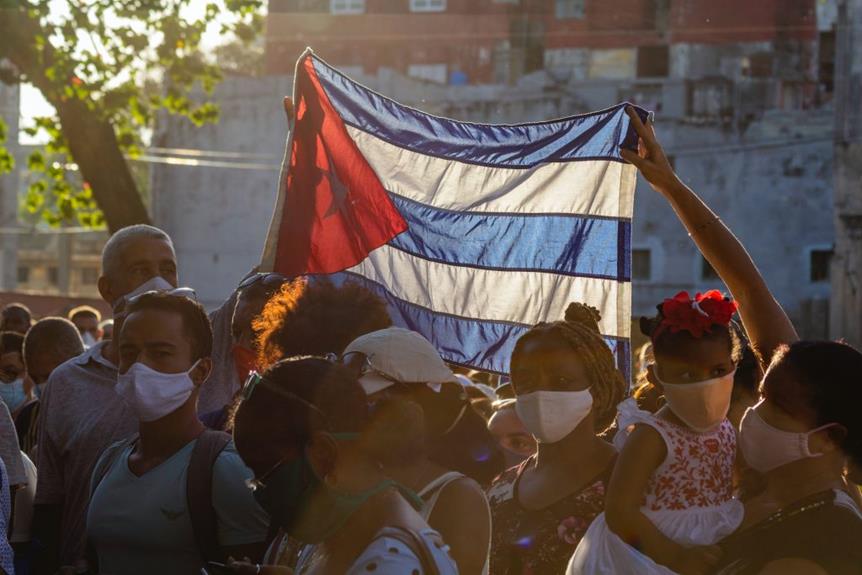To promote a peaceful transition to a Cuba that respects human rights
and political and economic freedoms

OTD in 1997, Cuban soldier gunned down a Danish student in Havana. Amnesty says hundreds of Cubans jailed for exercising their rights. Swedish NGO urges further int'l pressure on Cuba.

In the spring of 1997, Joachim Løvschall was in Havana studying Spanish. On March 29, 1997, in Havana, Cuba, he was shot and killed by a Castro regime soldier brandishing an AK-47. That was twenty-six years ago today.
Joachim posed no threat, he was unarmed. Joachim's family was never informed of the soldier's identity. No one was held accountable for the 26 year old man's death. Joachim's family is not satisfied with the official explanation.
Father of Joachim Løvschall, Christian Løvschall, spoke about his son's initial disappearance and the family’s efforts to find out where was Joachim on June 12, 2007, during a parallel forum at the United Nations Human Rights Council:
"Although the killing took place on the 29th of March, we only came to know about it on the 6th of April - i.e. after 8 days were we had the feeling that the Cuban authorities were unwilling to inform anything about the incident. Only because of good relations with Spanish speaking friends in other Latin American countries did we succeed in getting into contact with the family with whom Joachim stayed and the repeated message from their side was that they could reveal nothing, but that the situation had turned out very bad and that we had to come to Cuba as soon as possible. At the same time all contacts to the responsible authorities turned out negatively... Only after continued pressure from our side on the Cuban embassy in Copenhagen, things suddenly changed and the sad information was given to us by our local police on the evening of the 6th of April. We are, however, 100% convinced that had we not made use of our own contact and had we not continued our pressure on the embassy in Copenhagen, we might have faced a situation where Joachim would have been declared a missing person, a way out the Cuban authorities have been accused of applying in similar cases."
Christian Løvschall outlined what he had learned concerning his son's untimely death:
We do feel we were (and still are) left with no answers except to maybe one of the following questions: Where, When, Who, Why Starting out with the where we were told that Joachim was killed by the soldiers outside the Ministry of Interior.
Where
What we do not understand is why no fence or signs did inform that this is a restricted area? I have been on the spot myself, and the place appears exactly like a normal residential area. So you may question whether this in fact was the place of the killing? Contrary to this the authorities keep maintaining that the area was properly sealed off, and the relevant sign posts were in place.
When
As to when Joachim was killed we only have the information received from the police because of the delay informing one might believe that this is another forgery made up to cover the truth.
Who
The who was in our opinion has never been answered by the Cuban authorities. We understand that a private soldier on duty was made responsible for the killing, and also it has been rumored that his officer in charge has been kept responsible. This is of course the easy way out, but why can't we get to know the whole and true story?
Why
Why did the soldiers have to fire two shots, one to his body and one to his head, to murder him? Was Joachim violent and did he, an unarmed individual, attack the armed soldiers? Or is it simply that the instruction to Cuban soldiers are: first you shoot and then you ask? But again: Who can explain why two shots were needed?
26 years later and the human rights situation has not improved.

On March 27, 2023 Amnesty International released their annual report, and the chapter on Cuba is an indictment of the Cuban dictatorship. The introductory summary highlighted the Castro regime’s failure on all fronts: both civil and political rights, and social and economic rights.
Food shortages and electricity outages were frequent throughout the year. Hundreds of people remained in prison following a crackdown on protesters in July 2021. In the wake of Hurricane Ian, authorities deployed military cadets to repress widespread protests over electricity outages and interrupted the internet. Three prisoners of conscience remained in prison, representing only a tiny fraction of the total number of people feared detained for the peaceful exercise of their human rights.

Civil Rights Defenders, a Swedish NGO, on March 24, 2023 released a statement on the upcoming vote for the National Assembly titled “Cubans are allowed to vote but not to choose” in which Erik Jennische, head of the Latin America department at Civil Rights Defenders called for international solidarity for Cuba’s pro-democracy movement and that additional pressure be placed on the Cuban dictatorship.
“The important thing now is that human rights defenders working for democracy in the country receive support from the international community. The international community, in turn, also needs to put pressure on Cuba to hold free and democratic elections.”



No comments:
Post a Comment